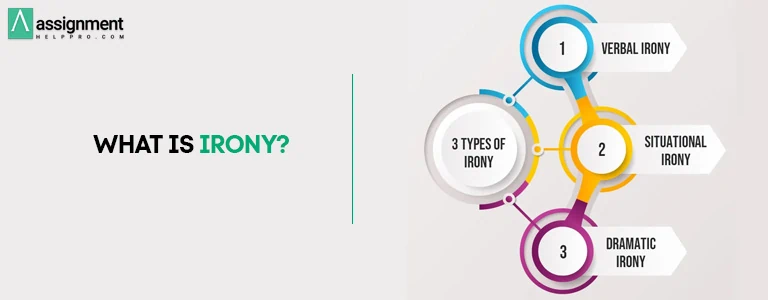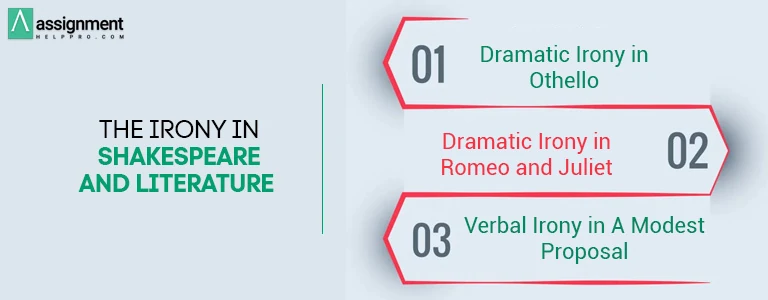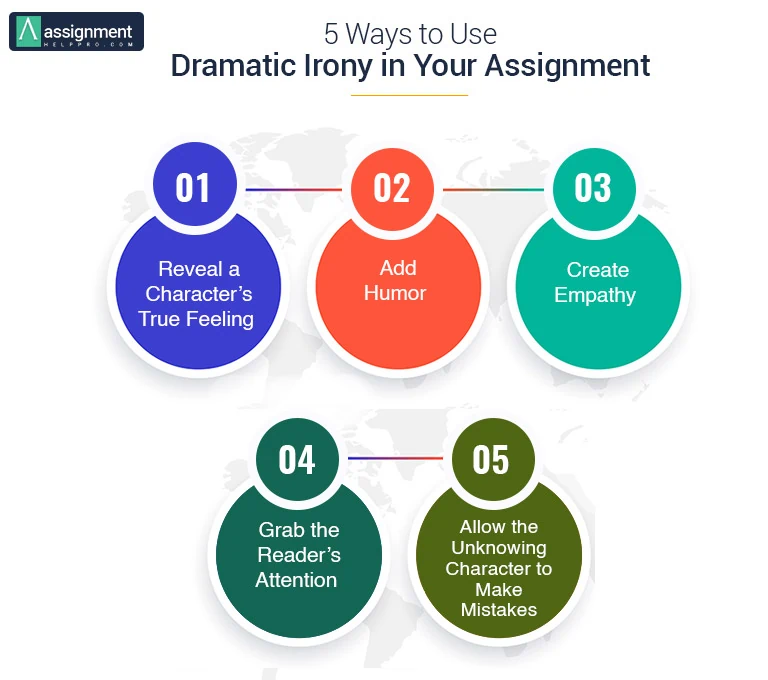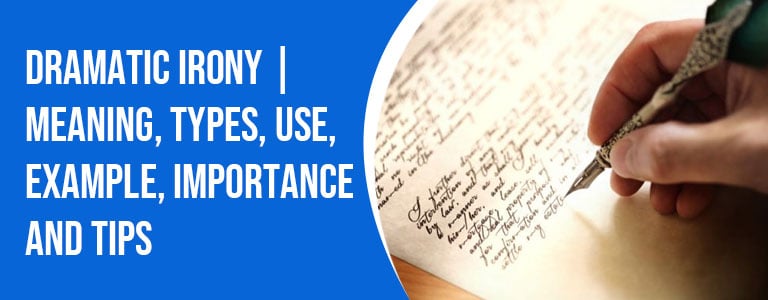Are you a budding writer who is interested in crafting an outstanding book or a play? If yes, then you must learn about various irony techniques. Usually, every writer will wish to hold the attention of the readers as the plot of a play or a novel moves forward. But in order to make that possible, you must effectively implement dramatic irony techniques in your writing. Do you know what dramatic irony means and how to include that in your writing? In case, you are unaware of the basics of dramatic irony, then keep on reading this blog. Here, you will learn everything about dramatic irony with examples.
What Is Irony?
One of the most important words used in writing is “irony.” It is a cliche. When something mirrors something that is not typical, it is ironic. Some inconsistencies can be amusing, while others can lead to tragedies. In general, irony is a complex concept that is classified into different types. It is more widely used in literature writing to grab the attention of the readers.
Irony in Creative Writing
The irony is something that reverses our desires. It can make sudden exciting bends in the road in the assignment after completing it. This gets us to snicker, laugh, or cry.
Irony can be difficult to write as first you need to concentrate on something unexpected to write about a situation. It helps in making your writing creative. It’s an extraordinary method to connect with your reader in reading an assignment.
The readers and the crowds have given the reasons for clashes alongside their goal before the characters of the entertainers of the work become mindful of the equivalent. The readers and the eyewitnesses find that the entertainers or the characters are utilizing a few addresses which are of surprising importance since they have the data that the main entertainers and characters of the work don’t have.
For example, in a play, the reader can have the data that a particular character will be murdered or going to end it all but different characters don’t have the foggiest idea about the equivalent.
Various Types of Irony
The irony is of three types. 1. Verbal Irony, 2. Situational Irony, 3. Dramatic Irony.
1. Verbal Irony
In this, the significance of the sentence that is communicated is different from what it implies or what the speaker needs to state.
Example: An individual says “Thanks without a doubt” to a server spilling water on him.
We can see he was distraught about this.
2. Situational Irony
This type of irony happens when any circumstance prompts structure and irony. At the point when the consequence of activity is in opposition to the normal impact.
Example: In “The Gift of the Magi,” by O. Henry, the spouse offers his watch to purchase his wife searches for her hair and the wife offers her hair to get her better half a chain for his watch.
3. Dramatic Irony
In this kind of irony, the audience sees only the words, and activities, but the speaker doesn’t.
It is where the watcher has the data but the character doesn’t. This consistently prompts errors for the character.
Example: In Shakespeare’s Romeo and Juliet, the crowd realizes that Juliet isn’t dead but Romeo accepts that she is.
Definition of Dramatic Irony
Dramatic irony is essentially a story element in which the audience learns significant components of the plot. Perhaps the characters say something that contradicts the audience’s beliefs. As a result of this additional knowledge, the authors can add tension or humor to the storyline. Furthermore, its definition in literature differs from that in film. However, it usually appears difficult to incorporate it into a tale that the audience may simply read.
Notable Dramatic Irony Examples
Practically, in every comic book/graphic novel/film transformation including a legend with a mystery personality—DC’s Batman, for example—the crowd knows the saint’s character while most characters don’t.
There’s Something About Mary, the character of Ted questioned by police about a murder, but he believes he has been questioned about getting a drifter.
In the principal Toy Story, Buzz believes he’s a space officer while the crowd knows he’s a toy.
What is the Use of Dramatic Irony?
Dramatic irony is utilized in making unfurled scenes and circumstances of characters. It is utilized predominantly because the writers or the movie creators need to hold an interest in the crowds or the readers.
In this situation, the crowds or the readers are given significant and needful data so they could have the information on something over the entertainers and characters of the literary works which helps the crowds to consider the storyline or to envision the consummation of the story.
The readers additionally hang tight for the circumstances and occasions of the story to happen which keeps them joined with the play or story or theater or movie. Dramatic irony is likewise utilized in making misfortune.
The readers become ready to feel for the main entertainers or the characters. The irony is mostly utilized in building up a comprehension of honest and genuine individuals and underscores showing pitiful outcomes of any sort of false impression. It likewise centers around the casualty of any sort of deficient comprehension or mistaken assumptions.
When to Include Dramatic Irony in Writing?
Dramatic irony happens in writing where the crowds have data more than the entertainers of the characters in the narratives have. The readers of any sonnet or the onlookers of any play have the data which at any rate the main characters or entertainers are ignorant of. This affects the interests of the crowds and readers. For example, the readers or the crowds may know about any snare that different characters don’t know about.
This creates pressure or anticipation and accordingly, the crowds are urged to hold up until the story or movie closes. This is for the most part utilized in making either tension or humor. In making misfortunes, the creators or movie producers additionally utilize dramatic irony.
In the acclaimed movie of Titanic by James Cameron, the crowds realize that the boat is going to hit the ice sheet but they can’t help the characters of the movie by implying them about reality. The crowds need to hold up until the finish of the movie to watch the successions and the story.
In Friends, Rachel soon after bringing forth Emma, imagines that she has been proposed to by Joey but the crowds realize that Joey identified the lost ring from their pocket of Ross and didn’t have any aim to propose to Rachel. Different humorous occasions have been seen with the utilization of dramatic irony where the crowds have all the data and they are held back to watch the last closure of the movie.
There are a few examples like The Merchant of Venice or Animal Farm. These are acclaimed examples where we can see dramatic irony making the mysterious minutes and empowering the crowds and the readers to hold up till the finish of the storyline.
Why is it Essential to Use Dramatic Irony in Writing?
The creators can utilize dramatic irony for different purposes. They can either need to build pressure or anticipation inside the crowds and readers or to cause them to feel the touch of misfortune that is going to happen. There are a few dramatic incongruities where humor is the primary subject.
The characters are discovered to think something to be genuine or genuine which isn’t the situation, it can make gigantic humorous occasions or scenes engaging the crowds and the readers. Intension, the job of dramatic irony is exceptionally fundamental.
In Hitchcock movies, we can see that the utilization of dramatic irony is very normal. The readers of the crowds know the genuine murderer or the executioner but the characters of the main entertainers of the movie don’t have such data.
This creates pressure, interest, and anticipation in the crowds or readers. Tension is accomplished by dramatic irony where the crowds are furnished with data about any dangers that the characters don’t have.
Read more: TEEL Structure | Know the Crucial Points to Write Great Assignment
Examples of Dramatic Irony in Literature
Find here, how Shakespeare and other renowned writers have used ironies in their writing.
Dramatic Irony in Othello
Othello is one of the most heartrending misfortunes at any point composed, and Shakespeare’s utilization of dramatic irony is one reason the play is so amazing to read and watch.
We realize that the cloth utilized as confirmation of Desdemona’s unfaithfulness might have been, indeed, taken by Emilia at Iago’s command. Desdemona is confined by Iago, and we realize she is honest. But we are too weak to stop Othello; he has made plans to murder his wife.
Iago, whom Othello thinks about as a companion, has been plotting Othello’s destruction for the span of the play. Othello doesn’t realize that Iago is the one calling the shots, but we do. We realize he is the person who persuades Roderigo to execute Cassio, even as we watch him profess to help Cassio after he is injured. Just we see Iago slaughter Roderigo before he can uncover the reality. Along these lines, we are complicit with Iago’s wrongdoings. We are the main observers, but we can sit idle.
Dramatic Irony in Romeo and Juliet
In the last demonstration of this prototype romantic tale, Shakespeare utilizes dramatic irony to keep the crowd as eager and anxious as can be.
Minister Laurence sends a courier to educate Romeo regarding Juliet’s arrangement to drug herself into deathlike unconsciousness. We watch with dismay as the courier neglects to convey this imperative snippet of data. Furthermore, however, we realize that Juliet isn’t generally dead, we see Romeo harm himself since he can’t live without her.
Learn How to Use Dramatic Irony in Your Assignment
Here are the 5 different ways to utilize dramatic irony in assignments-
1. Reveal a Character’s True Feeling
A character’s actual inclination should have been uncovered by permitting them to express their real thoughts to somebody they don’t perceive. If you are writing an assignment on a point, it must be explained to the reader appropriately.
Shakespeare’s Twelfth Night can be an example of this, wherein Olivia and Orsino are both tricked into accepting that Viola is a kid named Cesario.
2. Add Humor
Humor is something that is intended to be humorous or entertaining. Adding humor to an assignment will make energy for the reader to read the assignment. An example of this would be “Home Alone” where the looters misconstrue the movie clasps to the comic impacts.
3. Create Empathy
Demonstrating a character’s weakness in specific conditions that they don’t completely comprehend can make compassion. At the point when you utilize dramatic irony in writing your assignment, you can interface with the principle theme to a profound, important level.
An example of this would be with sickening dread movies where the character runs for well-being at that place and arrives at where the executioner is covering up.
4. Grab the Reader’s Attention
Continuously recollect that the consideration of the reader is significant when you have wrapped up the assignment. Keep the reader turning pages until the character knows reality. The reader knows reality from the earliest starting point but he ought not to quit reading, he should read until the character doesn’t discover the reality.
Example: Stephen King’s Carrie utilizes dramatic irony along these lines. The reader knows Carrie may have embarrassed at the prom yet he continues reading to perceive what will happen when she learns reality.
5. Allow the Unknowing Character to Make Mistakes
If a character knows the full image of what is happening then he won’t commit errors. He will likewise not hang tight for reality finally. When writing an assignment, write it so that the character doesn’t have the foggiest idea about reality.
Related post: What is PEEL Writing? Tips for writing a PEEL Paragraph
Points to Remember While Using Dramatic Irony
Keep these things in mind when you utilize dramatic irony techniques in your writing.
- Be careful not to undermine your character’s believability to irritate the reader. When the crowd is aware of something, they will begin to believe that it is obvious. It’s hard to show a character who seems to ignore the obvious to the reader. Characters that are unaware of reality quickly lose their interest.
- Keep the dramatic irony flawless by not being unexpectedly clever by having your character act against logic. When a victim runs up the steps looking for help in a thriller or spine-chilling thriller, the audience laughs. Abnormal characters, like those careless in regard to the plainly obvious, can’t solely be upsetting; they can incorporate humor where you don’t require it.
Wrapping Up
In this essay, we’ve so far explored the principles of dramatic irony, but there’s still a lot more to learn. You can’t employ irony as readily in your work. Moreover, you must think critically and integrate that into your story organically. In general, applying dramatic irony in writing requires more practice. Contact us right away if you experience difficulty incorporating dramatic irony into your writing. The literature assignment experts on our platform have strong knowledge of all types of ironies. Hence, they will aid you in completing your task in a more innovative manner by effectively applying the dramatic irony strategies.
Read it: Know The Secrets of Poems with Poetic Examples
1. What is the best definition of dramatic irony?
Dramatic irony simplistically means the audience is more aware of the situation than the character of fiction. It means a character speaks something without being aware of a situation which intensifies or lessens the complexity of the piece.
2. Which is an example of dramatic irony?
Macbeth by William Shakespeare is an example is one of the best examples of dramatic irony in literature.
3. What is dramatic irony kid definition?
Dramatic irony in simpler words means a character is unaware of the situation but the audience is fully aware of it.
4. Which is the best example of dramatic irony in the play?
Macbeth by William Shakespeare is an example is one of the best examples of dramatic irony in English plays.






